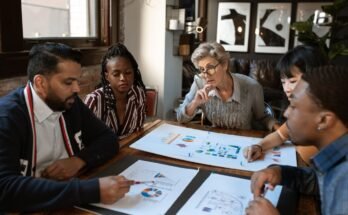In the world today, businesses, organizations, governments, and individuals are all working towards making a positive and lasting impact on various sectors of society. When we speak of the “Key Areas of Impact,” we are referring to the broad and influential sectors where actions and decisions can create significant change, transformation, or improvement. These areas are central to shaping the future and ensuring sustainable development, economic growth, and the overall well-being of communities. Understanding the primary domains of impact is essential for prioritizing efforts, resources, and policies that will drive change in the right direction.
This article will explore several key areas of impact across various domains, including environmental sustainability, social equity, economic development, health, technology, and education.
1. Environmental Sustainability
Environmental sustainability refers to actions and policies aimed at preserving the Earth’s natural resources for future generations. It involves reducing waste, mitigating climate change, conserving water and energy, and protecting biodiversity.
- Climate Change Mitigation and Adaptation: One of the most pressing issues facing the world today, climate change is a key area of focus for individuals, corporations, and governments. Initiatives that reduce greenhouse gas emissions, promote renewable energy sources, and increase carbon offsetting projects are critical for mitigating climate change and its devastating effects.
- Waste Reduction and Recycling: Circular economy models that emphasize reusing, recycling, and reducing waste have become pivotal to achieving environmental sustainability. Companies and cities that adopt sustainable waste management practices are leading the charge towards cleaner, greener environments.
- Biodiversity Conservation: Ensuring the protection of ecosystems, wildlife, and endangered species is vital to maintaining the health of the planet. By establishing protected areas, implementing conservation programs, and promoting sustainable land use practices, we can safeguard biodiversity.
2. Social Equity and Inclusion
Social equity and inclusion are about ensuring that all individuals, regardless of their race, gender, sexual orientation, economic background, or ability, have access to the same opportunities and resources. This area of impact is closely linked to the fight against poverty, inequality, and discrimination.
- Gender Equality: Gender equity is a cornerstone of social justice. Empowering women and ensuring their participation in the workforce, political life, and decision-making processes leads to healthier and more prosperous societies. Equal access to education, healthcare, and legal rights for women and girls is crucial.
- Racial and Economic Equity: Addressing disparities in wealth, education, and access to opportunities based on race, ethnicity, and class is essential to creating more just societies. Targeted programs such as affirmative action, community development initiatives, and social safety nets help bridge the gap between disadvantaged groups and more privileged ones.
- Access to Healthcare: Social equity also includes equal access to quality healthcare. Efforts to expand universal healthcare and reduce barriers to treatment for marginalized communities ensure that health outcomes are not determined by social status.
3. Economic Development and Innovation
Economic development is a critical area of impact that directly influences the prosperity and stability of regions and nations. By investing in the right sectors and creating opportunities for entrepreneurship, innovation, and job creation, economic development can significantly improve quality of life.
- Job Creation and Workforce Development: Building a skilled workforce through education, vocational training, and job creation programs helps reduce unemployment and inequality. The global shift toward remote and digital work also creates new opportunities for people across various sectors.
- Entrepreneurship and Startups: Supporting entrepreneurs and startups leads to job creation, innovation, and the growth of new industries. Governments, NGOs, and private investors play a key role in providing funding, mentorship, and networks to foster the entrepreneurial ecosystem.
- Sustainable Business Practices: Encouraging businesses to adopt socially responsible and environmentally sustainable practices helps build a more resilient economy. These businesses not only contribute to economic growth but also support long-term social and environmental goals.
4. Health and Well-being
Health is one of the most important factors that directly affects the quality of life for individuals and communities. A focus on health and well-being encompasses physical, mental, and emotional health, as well as the availability of quality healthcare.
- Universal Health Coverage: Expanding access to affordable and quality healthcare ensures that all people, regardless of income or geography, can receive medical treatment when needed. Universal health coverage reduces preventable deaths and improves the overall well-being of communities.
- Mental Health Awareness: Increasing awareness about mental health issues, reducing stigma, and providing adequate mental health services are key areas of impact in the health sector. Tackling mental health challenges is crucial to enhancing productivity, quality of life, and social harmony.
- Public Health Initiatives: Governments and health organizations focus on disease prevention, vaccination programs, and health education to improve public health. Addressing public health issues such as sanitation, access to clean water, and nutrition helps reduce the burden of disease.
5. Technology and Innovation
Technology has revolutionized virtually every aspect of our lives. From the development of new tools and platforms to the advancement of artificial intelligence and biotechnology, technology has a profound impact on the economy, society, and the environment.
- Artificial Intelligence (AI) and Automation: AI is transforming industries by automating processes, improving efficiencies, and creating new opportunities. However, it also presents challenges such as job displacement and ethical considerations, which must be addressed responsibly.
- Digital Inclusion: In the digital age, access to the internet and digital tools is essential for social and economic participation. Expanding digital infrastructure, improving internet access, and providing digital literacy training are vital to ensuring no one is left behind in the technology-driven world.
- Innovation in Healthcare: The healthcare sector is seeing a surge in technological innovation, from telemedicine to wearable health devices and AI-powered diagnostics. These advancements have the potential to revolutionize healthcare delivery and improve patient outcomes worldwide.
6. Education and Skill Development
Education is the foundation of human development and the key to addressing many global challenges. A strong educational system empowers individuals, promotes social mobility, and drives economic progress.
- Access to Quality Education: Ensuring that all children, especially in underserved areas, have access to quality education is a fundamental goal. Investing in schools, teachers, and educational materials helps children learn and thrive.
- Lifelong Learning and Skills Development: In a rapidly changing world, ongoing learning and skills development are essential to staying relevant in the workforce. Fostering a culture of lifelong learning, through online platforms, vocational programs, and higher education, enables individuals to adapt to new industries and technologies.
- Promoting STEM Education: Science, technology, engineering, and mathematics (STEM) education is crucial to driving innovation and solving global challenges. By encouraging young people, especially women and underrepresented groups, to pursue careers in STEM fields, we can ensure the future workforce is prepared for the challenges ahead.
Conclusion
The key areas of impact outlined above are interconnected and must be approached with a holistic perspective to create meaningful, sustainable change. Whether it’s addressing climate change, improving health, fostering economic development, or promoting social equity, every action taken has the potential to create far-reaching consequences. By focusing on these critical domains and prioritizing initiatives that drive positive change, we can build a more sustainable, equitable, and prosperous future for all.



